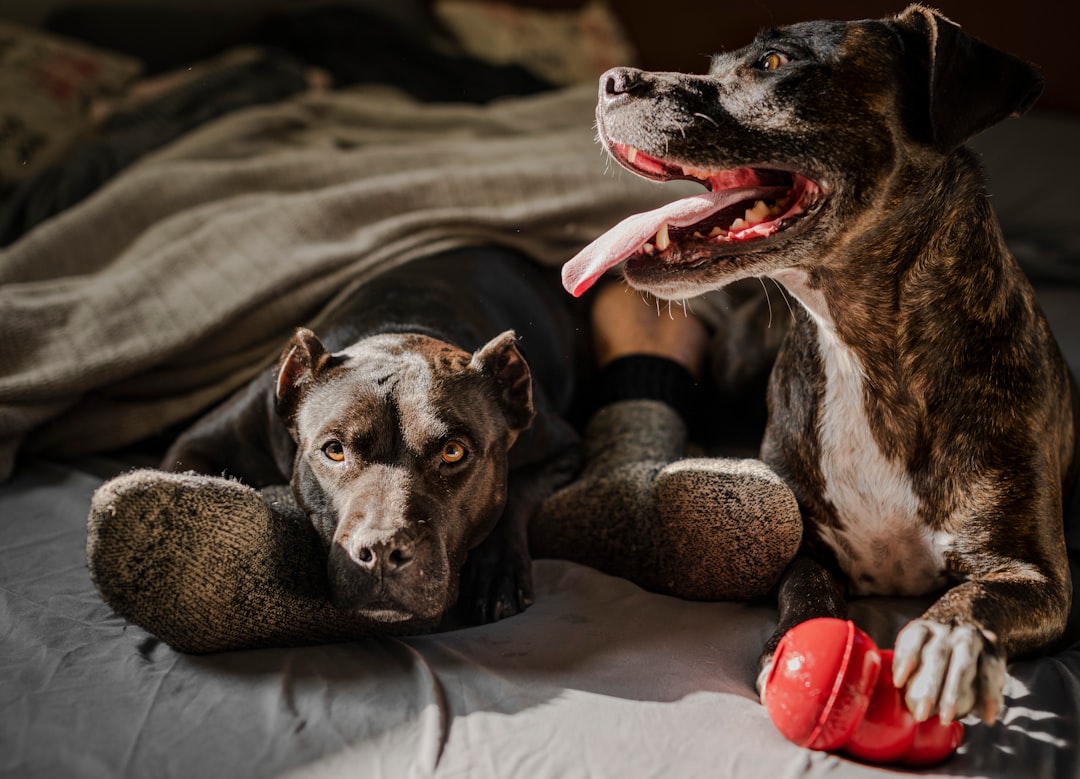Support our educational content for free when you purchase through links on our site. Learn more
Top 20 Dog Breeds That Are Naturally Quiet [2023]
Dogs have long been considered man's best friend, and for good reason. They are loyal, loving, and can bring endless joy to our lives. However, not all dogs are created equal when it comes to noise level. Some breeds are naturally more quiet than others, making them the perfect companions for those who prefer a quieter and more peaceful household.
In this article, we will introduce you to the top 20 dog breeds that are naturally quiet. We will cover each breed's characteristics, temperament, and why they are known for their quietness. So whether you live in an apartment or simply prefer a quieter atmosphere, these breeds will be a great fit for you.
Table of Contents
- Basenji
- Cavalier King Charles Spaniel
- Bulldog
- Shih Tzu
- Italian Greyhound
- Bernese Mountain Dog
- Borzoi
- Greyhound
- Newfoundland
- Saint Bernard
- Scottish Deerhound
- Rhodesian Ridgeback
- Cavalier King Charles Spaniel
- Whippet
- Irish Wolfhound
- Chow Chow
- Great Dane
- Bloodhound
- Bullmastiff
- Chinese Shar-Pei
- FAQ
- Quick Tips and Facts
- Useful Links
- Reference Links
Introduction
If you're looking for a dog that won't disturb the peace, these quiet breeds are a great choice. While all dogs have the potential to bark, some breeds have a reputation for being naturally quieter. Whether it's due to their temperament, training, or genetics, these breeds tend to bark less frequently and at a lower volume than others.
Basenji
The Basenji is a small dog breed that is often referred to as the "barkless dog." This breed produces unique vocalizations that are often described as yodels or howls rather than barks. Basenjis are known for their independence, intelligence, and cleanliness. They are an ancient breed that originated in Central Africa and were historically used for hunting. Basenjis are generally quiet and don't bark excessively, making them an excellent choice for those looking for a peaceful companion.
Key Characteristics:
- Intelligent and independent breed.
- Produces unique vocalizations instead of barks.
- Low grooming needs.
- Moderate exercise requirements.
Temperament: Basenjis are known for their alertness and curiosity. They can be reserved with strangers but are affectionate and loyal to their families. While they are generally quiet, Basenjis still have a lot to say and can be quite vocal when something catches their attention.
Pros:
- Doesn't bark excessively.
- Low grooming needs.
- Well-suited for apartments.
Cons:
- Can be stubborn and headstrong.
- May not do well with small animals.
- Requires mental and physical stimulation.
Cavalier King Charles Spaniel
The Cavalier King Charles Spaniel is a beloved breed known for its friendly and affectionate nature. Despite its royal and elegant appearance, the Cavalier King Charles Spaniel is a laid-back and quiet breed. They are great companions and adapt well to various living situations, making them an excellent choice for families or individuals looking for a calm and quiet dog.
Key Characteristics:
- Small-sized breed with a friendly temperament.
- Low exercise needs.
- Requires regular grooming.
- Gentle and good-natured disposition.
Temperament: Cavalier King Charles Spaniels are known for their sociable and gentle nature. They get along well with children and other pets, making them an ideal choice for families. While they are generally quiet, Cavaliers can become vocal when they want attention or feel left out.
Pros:
- Quiet and calm demeanor.
- Excellent with children and other pets.
- Easily adapts to various living situations.
Cons:
- Requires regular grooming.
- Prone to certain health issues.
- May be prone to separation anxiety if left alone for long periods.
Bulldog
The Bulldog, with its distinctive wrinkled face and muscular build, may not be the first breed that comes to mind when thinking of quiet dogs. However, Bulldogs are surprisingly calm and gentle, often preferring lounging around to vigorous exercise. They are known for being good with children and have a generally easygoing and peaceful disposition.
Key Characteristics:
- Medium-sized breed with a sturdy build.
- Low exercise needs.
- Requires minimal grooming.
- Docile and friendly nature.
Temperament: Bulldogs are known for their calm and friendly nature. They are patient and tolerant, making them great companions for families. While they are not typically barkers, Bulldogs may snort, grunt, or make other unique noises due to their facial structure.
Pros:
- Quiet and relaxed demeanor.
- Excellent with children.
- Low exercise needs.
Cons:
- Prone to certain health issues.
- Requires regular cleaning of facial wrinkles.
- Can be sensitive to extreme weather conditions.
Shih Tzu
The Shih Tzu is a small toy breed known for its long flowing coat and friendly temperament. While they may look like divas, Shih Tzus are generally calm and well-mannered dogs. They are great for apartment living and don't require a substantial amount of exercise. Despite their regal appearance, Shih Tzus are known for their quiet and peaceful nature.
Key Characteristics:
- Small-sized breed with a luxurious coat.
- Low exercise needs.
- Requires regular grooming.
- Friendly and affectionate disposition.
Temperament: Shih Tzus are known for their gentle and friendly nature. They get along well with children and other pets, making them an ideal choice for families. While they are generally quiet, Shih Tzus can be sensitive to environmental changes and may express their concerns through barking or other vocalizations.
Pros:
- Calm and quiet demeanor.
- Excellent with children and other pets.
- Suitable for apartment living.
Cons:
- Requires regular grooming.
- Can be prone to separation anxiety.
- May be affected by extreme temperatures.
Italian Greyhound
The Italian Greyhound is a small dog breed known for its elegant and graceful appearance. Despite its slender build, the Italian Greyhound is a calm and quiet breed. They are ideal for apartment living and don't require an excessive amount of exercise. Italian Greyhounds are known for being affectionate and gentle with their owners, making them great companions for those seeking a quiet and low-maintenance dog.
Key Characteristics:
- Small-sized breed with a slender build.
- Moderate exercise needs.
- Low grooming needs.
- Affectionate and gentle disposition.
Temperament: Italian Greyhounds are known for their gentle and affectionate nature. They enjoy being close to their owners and thrive in a calm and quiet environment. While they are generally quiet, Italian Greyhounds can become anxious or vocal if left alone for long periods.
Pros:
- Calm and quiet demeanor.
- Minimal grooming needs.
- Suitable for apartment living.
Cons:
- Can be prone to separation anxiety.
- May exhibit destructive behavior if bored.
- Sensitive to cold temperatures.
Bernese Mountain Dog
While the Bernese Mountain Dog is not typically associated with being a quiet breed, they are known for their calm and gentle nature. These large-sized dogs are well-mannered and have a friendly disposition. Although they may bark when necessary, Bernese Mountain Dogs are generally quiet and are especially great with children.
Key Characteristics:
- Large-sized breed with a sturdy build.
- Moderate exercise needs.
- Requires regular grooming.
- Friendly and calm disposition.
Temperament: Bernese Mountain Dogs are known for their friendly and calm nature. They are loyal and protective of their families, making them excellent companion dogs. While they are generally quiet, Bernese Mountain Dogs may bark to alert their owners of potential danger or unknown visitors.
Pros:
- Calm and gentle demeanor.
- Great with children and families.
- Moderate exercise needs.
Cons:
- Requires regular grooming.
- Can be prone to certain health issues.
- Not suitable for apartment living due to their size.
Borzoi
The Borzoi, also known as the Russian Wolfhound, is a large and graceful breed. Despite their size, Borzois are known for their gentle and quiet disposition. They are sighthounds with a keen eyesight and hunting background, but they make excellent family pets due to their calm and gentle nature. Borzois are considered to be couch potatoes and are generally quiet and easygoing.
Key Characteristics:
- Large-sized breed with a slender and graceful build.
- Moderate exercise needs.
- Requires minimal grooming.
- Gentle and quiet disposition.
Temperament: Borzois are known for their gentle and quiet nature. They are independent yet loyal to their families. While they are generally quiet, Borzois can be reserved with strangers but are affectionate with their human companions.
Pros:
- Calm and quiet demeanor.
- Gentle and affectionate.
- Moderate exercise needs.
Cons:
- Requires a securely-fenced yard.
- Limited availability of breeders.
- Some individuals may have a prey drive.
Greyhound
Greyhounds are known for their speed and agility, but they are also surprisingly quiet and docile dogs. While they can reach incredible speeds on a racetrack, Greyhounds are known for their calm and easygoing nature at home. They are gentle, friendly, and good with children. Greyhounds are generally quiet and make excellent companions for those seeking a peaceful and low-maintenance canine companion.
Key Characteristics:
- Large-sized breed with a lean and muscular build.
- Moderate exercise needs.
- Requires minimal grooming.
- Gentle and easygoing disposition.
Temperament: Greyhounds are known for their calm and gentle nature. They are affectionate with their families and get along well with other dogs. While they are generally quiet, Greyhounds can become anxious or vocal if left alone for long periods.
Pros:
- Calm and docile demeanor.
- Excellent with children and other dogs.
- Minimal grooming needs.
Cons:
- Requires a securely-fenced yard.
- Sensitive to cold weather.
- May exhibit prey drive towards small animals.
Newfoundland
The Newfoundland is a large and gentle giant known for its strength and swimming abilities. They are often referred to as "nanny dogs" due to their natural protective nature, especially towards children. Despite their impressive size, Newfoundlands are surprisingly calm, quiet, and easygoing. Their friendly and patient nature makes them a popular choice for families and individuals seeking a peaceful and loving companion.
Key Characteristics:
- Extra-large-sized breed with a strong and massive build.
- Moderate exercise needs.
- Requires regular grooming.
- Gentle and patient disposition.
Temperament: Newfoundlands are known for their gentle and patient nature. They are intelligent and easily trainable, making them excellent family dogs. While they are generally quiet, Newfoundlands may bark to alert their owners of potential danger.
Pros:
- Calm and gentle demeanor.
- Excellent with children and families.
- Moderate exercise needs.
Cons:
- Requires regular grooming.
- Can be prone to certain health issues.
- Not suitable for apartment living due to their size.
Saint Bernard
The Saint Bernard is a large and imposing breed known for its gentle and noble nature. Despite their size, they have a calm and quiet demeanor, making them a great fit for families and individuals seeking a peaceful companion. They are renowned for their patience and loyalty, especially towards children. However, keep in mind that their large size and potential for slobbering may not be suitable for everyone.
Key Characteristics:
- Extra-large-sized breed with a strong and muscular build.
- Moderate exercise needs.
- Requires regular grooming.
- Calm and patient disposition.
Temperament: Saint Bernards are known for their gentle and patient nature. They are friendly and good-natured, making them excellent family pets. While they are generally quiet, Saint Bernards may bark to alert their owners of potential danger.
Pros:
- Calm and gentle demeanor.
- Excellent with children and families.
- Moderate exercise needs.
Cons:
- Requires regular grooming.
- Can be prone to certain health issues.
- Not suitable for apartment living due to their size.
Scottish Deerhound
The Scottish Deerhound is a large and gentle breed with a noble and dignified appearance. Despite their size, Scottish Deerhounds are known for their quiet and laid-back nature. They are calm and affectionate dogs that form strong bonds with their families. Scottish Deerhounds are generally quiet and make excellent companions for those seeking a peaceful and low-maintenance canine companion.
Key Characteristics:
- Large-sized breed with a long and slender build.
- Moderate exercise needs.
- Requires minimal grooming.
- Gentle and quiet disposition.
Temperament: Scottish Deerhounds are known for their calm and quiet nature. They are gentle and friendly with their families, making them excellent family dogs. While they are generally quiet, Scottish Deerhounds may bark to alert their owners of potential danger.
Pros:
- Calm and quiet demeanor.
- Gentle and affectionate.
- Minimal grooming needs.
Cons:
- Requires a securely-fenced yard.
- Limited availability of breeders.
- Not suitable for apartment living.
Quick Tips and Facts
- When choosing a dog breed, it's essential to consider your lifestyle, living arrangement, and personal preferences.
- While these breeds are known for being naturally quiet, individual dogs may vary in behavior and temperament.
- Quiet dogs still need mental and physical stimulation, so be sure to provide them with regular exercise and enrichment activities.
- Proper training and socialization are crucial for all dogs, regardless of their breed or temperament.
- Remember that even naturally quiet breeds can bark if they feel threatened, anxious, or if they need to communicate something important to their owners.
FAQ
What type of dog barks the least?
When it comes to the quietest dog breeds, several breeds are known for their minimal barking tendencies. The Basenji, Cavalier King Charles Spaniel, Bulldog, and Shih Tzu are among the breeds that are considered to bark the least. However, it's important to note that individual dogs may still have their own unique vocalization habits.
Is there a non-barking dog?
While there is technically no such thing as a completely non-barking dog, certain breeds, such as the Basenji, are known for being relatively barkless. However, it's important to remember that even these breeds may vocalize in other ways, such as howling, whining, or growling.
What dogs don't bark at night?
Many quiet dog breeds are less prone to barking at night. Breeds such as the Basenji, Cavalier King Charles Spaniel, Shih Tzu, Italian Greyhound, and Greyhound are known for their calm and quiet nature, which often translates to lower nighttime barking. However, individual dogs may still bark if they perceive a threat or hear unusual sounds.
Useful Links
- Basenji on AKC
- Cavalier King Charles Spaniel on AKC
- Bulldog on AKC
- Shih Tzu on AKC
- Italian Greyhound on AKC
- Bernese Mountain Dog on AKC
- Borzoi on AKC
- Greyhound on AKC
- Newfoundland on AKC
- Saint Bernard on AKC
- Scottish Deerhound on AKC
Reference Links
*[AKC]: American Kennel Club






